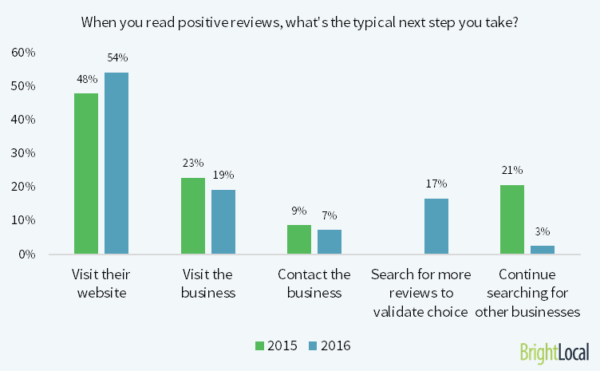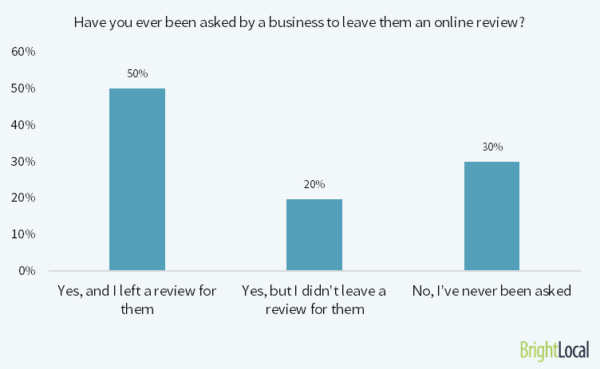70% of consumers will leave a review for a business when asked
Want to get inside the minds of potential customers for your local business? Columnist Sherry Bonelli shares insights from BrightLocal’s annual Local Consumer Review Survey.
A business’s online reputation is more important than ever. In fact, a company’s online reputation is fast becoming one of their most valuable assets — if managed properly.
Why? In a world where online reviews show up virtually every time a person searches for a local business, potential customers can’t help but be confronted with reviews about a local business’s products or services — the good, the bad and (sometimes) the downright ugly.
So what impact do these reviews have on people searching for a place to spend their money?
 100vw, 677px” data-lazy-src=”https://searchengineland.com/wp-content/seloads/2016/11/online-reviews-are-everywhere.jpg” /></p>
<h2>BrightLocal’s 2016 Local Consumer Review Survey</h2>
<p>Every year, BrightLocal (disclosure: my employer) surveys everyday consumers to gauge the sentiment and attitudes they have about the local companies they do business with. The purpose of the survey? To help small to medium-sized businesses (SMBs), digital marketing agencies and SEOs understand how online reviews influence the purchasing decisions consumers make as they search for local companies, products or services.</p>
<p>If you (or your clients) have been avoiding the topic of online reviews up until now, I have a feeling you will change your mind after you learn more about how consumers read and act (or don’t act) after evaluating online reviews about businesses.</p>
<h2>About the 2016 Local Consumer Review Survey</h2>
<p>The <a href=) Local Consumer Review Survey is in its sixth year. Over the past several years, there has been a noticeable shift in how consumers search online for local businesses and the importance online reviews play in a consumer’s purchasing process.
Local Consumer Review Survey is in its sixth year. Over the past several years, there has been a noticeable shift in how consumers search online for local businesses and the importance online reviews play in a consumer’s purchasing process.
This year BrightLocal surveyed a US consumer panel made up of 1,000 individuals. The survey questions explore how consumers read and use the reviews they see online. The answers show how businesses and marketers can qualify the value consumers put on online reviews and whether these reviews have any impact on a consumer’s purchasing decisions.
Consumers see online reviews almost every time they search
More and more these days, consumers are using the internet to find local businesses and see online reviews almost every time they go online to do a local search. Why the increase?
Over the past few years, many local businesses have realized the importance of optimizing their online presence for the local market by claiming their Google My Business or Bing Places for Business pages, creating location-specific pages on their website, adding Google Maps to their site and other local SEO strategies.
Additionally, Google shows online reviews in many search engine results pages (SERPs), and they even recently started adding third-party review sites and reviews to a business’s Knowledge Panel.
 100vw, 506px” data-lazy-src=”https://searchengineland.com/wp-content/seloads/2016/11/Google-Knowledge-Panel-Reviews-1.jpg” /></p>
<p>Also, because people have access to a variety of devices to perform searches on, such as smartphones and tablets, it’s easy for them to jump online wherever they are and search for reviews about a business, product or service.</p>
<p>So, how do consumers read and use the information found in reviews? Let’s find out by looking at some of the survey questions and answers.</p>
<h2>Which of these business types have you read online reviews for?</h2>
<p><img class=) Fake reviews, and the effect they have on eroding consumer trust, have become hot topics as of late. As this topic gets more media coverage, consumers become more aware of the pitfalls of online reviews.
Fake reviews, and the effect they have on eroding consumer trust, have become hot topics as of late. As this topic gets more media coverage, consumers become more aware of the pitfalls of online reviews.
When you read positive reviews for a business, what is the typical next step you take?

Key findings:
- After reading positive reviews, 54 percent of consumers will visit the business’s website (48 percent in 2015).
- 19 percent will visit the business directly.
- 17 percent will search for additional reviews about the business.
The most common next step for consumers who read reviews is to visit the business’s website (54 percent). This is an easy next step because people are already online, and there’s typically a link to the business’s website from the review sites. This does reinforce the need for SMBs to have a mobile-friendly website.
Only 19 percent say their next step would be to visit a business’s premises. This will vary depending on the type of business a consumer is looking for. For instance, if they’re looking for a restaurant, the numbers will be higher; if they’re searching for a physician or wedding planner — something that might first require an appointment or phone consultation — then it’s unlikely that your next step would be to visit the business.
A full 17 percent of consumers say that they would seek out additional reviews about the business they are considering. This indicates a high level of interest in a particular business — if a consumer is continuing to look for reviews, then that means they are probably getting closer to a buying decision.
Have you ever been asked by a business to leave an online review for them?

Key findings:
- 70 percent of consumers have been asked by a business to leave a review.
- 50 percent of consumers have been asked to leave a review about a business and actually left a review.
This is important: if asked, approximately 71 percent of consumers will leave a review for a business. This reinforces the need for every business to have a reputation marketing strategy.
While this finding does illustrate the importance of asking customers for reviews, businesses must exercise caution and patience in doing so. Why? Too many reviews acquired within a short time frame can look suspicious, meaning those reviews could end up getting flagged and filtered out on the review platform. Ask your customers for reviews gradually over time, and don’t overdo it.
Additionally, businesses should never use offers to incentivize consumers to leave reviews (That’s considered unethical).
Reviews, positive or negative, serve as a useful feedback tool for businesses. Use this information to improve your customer service or business offerings.
Want to learn more?
Do you want to see even more questions and answers, as well as a deeper analysis of the results of this year’s survey? Check out the full 2016 Local Consumer Review Survey.



